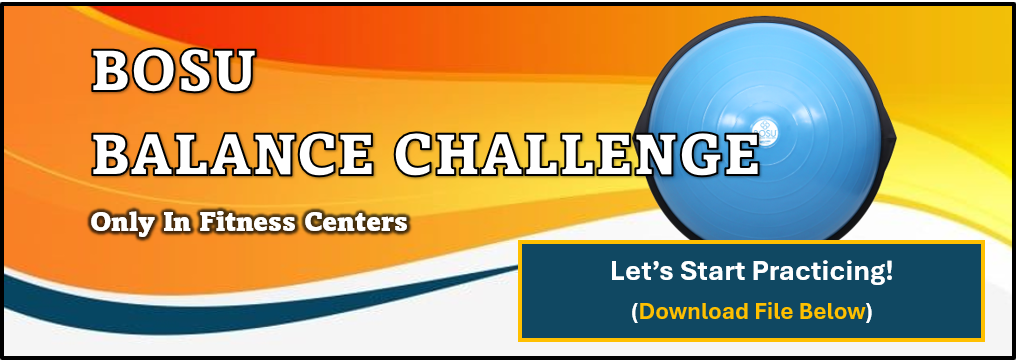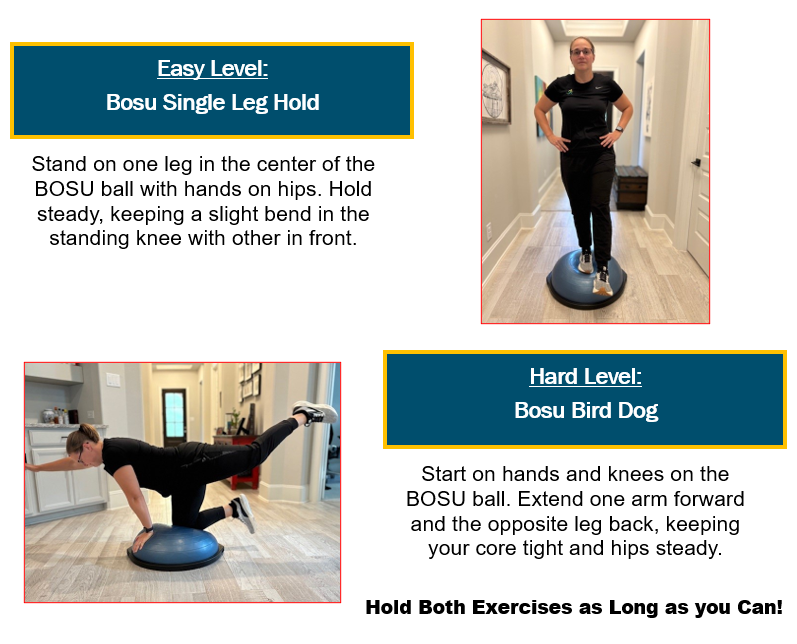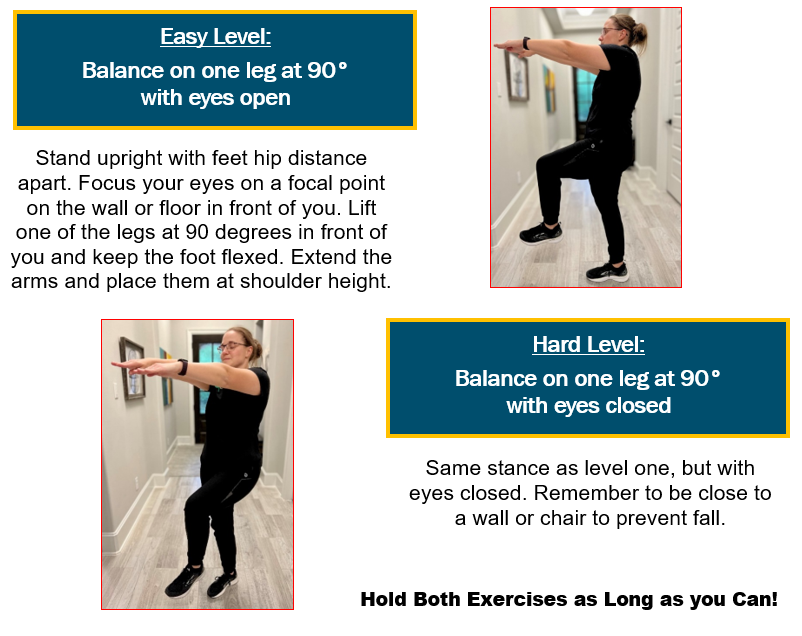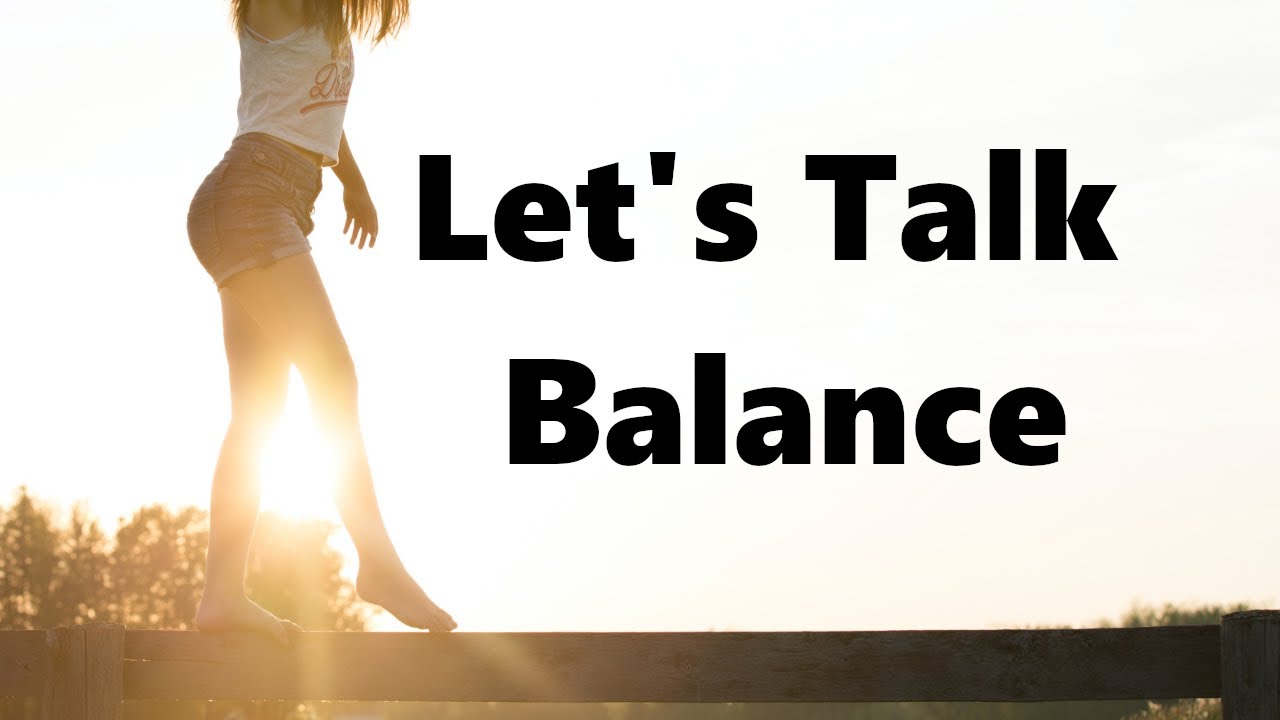2025 Balance Challenge
Starting Sept. 15th-28th




Bosu Practice Sheet: (Turn in practice sheet at the beginning of challenge to be entered into a raffle prize!)
Download File
Pop in and test your balance on our Zibrio Board starting Sept. 15th (it only takes just a minute)!
By doing so, not only will you receive your balance score, but you'll also secure a spot in our raffle prize.


Virtual Practice Sheet (Email practice sheet at the beginning of challenge to lauren.dufrene@bp.com and be entered into a raffle prize!)
Download File



How long should I be able to balance?
The following numbers are based on a study where American researchers asked people from diffeent age groups to balance on one leg so they could tell what 'normal' looks like.
As you can see, ablility to do the one-legged test with eyes closed tends to fall off rapidly with age...
People under 40 with eyes open averaged 45 seconds. With eyes closed: 15 seconds
Aged 40-49 with eyes open averaged 42 seconds. With eyes closed:13 seconds
Aged 50-59 with eyes open averaged 41 seconds. With eyes closed:8 seconds
Aged 60-69 with eyes open averaged 32 seconds. With eyes closed: 4 seconds
Aged 60-69 with eyes open averaged 22 seconds. With eyes closed: 3 seconds
For more details, please use the following link:
How Long Should I Be Able To Balance on One Leg? | Posture Movement Pain
Here are the best ways to improve balance:
Stretching:
Improving your flexibility can result in better balance. Stretches can also help improve your posture and lead to better stability and balance. Tight muscles can throw off your center of balance and make you more susceptible to trips and falls. Doing stretches that target key muscles will increase the range of motion (ROM) and improve your balance.
Top 4 Stretches to improve balance:
Hip Stretch
Hamstring stretch
Standing Quad Stretch
For more details on these stretches please use the following link:
4 Essential Stretches That Improve Your Balance | Prevention
Mobility Training:
Joint stiffness can lead to poor mobility, which you’ve probably noticed when you been getting out of bed or even getting up and down from a chair. Better mobility can lead to improve balance and coordination which allows us to stay more active.
Top 6 Mobility Exercises to improve Longevity:
Tightrope Walking
Tree Pose
Lying Down Marches
Lateral Toe Taps
Standing Marches
Single-Leg Stance
For more details on these mobility exercises please use the following link:
The 6 Best Mobility Exercises for Longevity | Well+Good (wellandgood.com)
Want to Age Well? Improve Your Balance With This 5-Minute Foot-Mobility Sequence | livestrong
Exercising:
Strengthening the muscles in your legs, core, and arms can lead to improvements in your balance. A general progression to get more challenging starts at a hard surface progress to carpet, or a thin yoga mat, a thick mat and finally an unstable surface such as a BOSU. A tennis shoe provides more stability thus making barefoot more challenging.
There are many different types of exercises you can do to help improve your balance. Ask a qualified fitness professional if you need help putting together a training program.
Below are some clinically approved educational sources for balance exercises:
5 Exercises to Train Balance in Motion (acefitness.org)
5 TRX Exercises to Improve Balance (acefitness.org)
5 Ways to Progress Traditional Balance Exercises (acefitness.org)
BOSU Balance Exercises | 7 Basic BOSU Exercises to Try (acefitness.org)
Balance Exercises: 5 Core Exercises to Improve Balance | ACE Blog (acefitness.org)
Top 8 conditions that affect balance:
Inner Ear Problems
Vision Problems
Muscle & Joint Problems
Nervous System Problems
Heart Problems
Anxiety & Stress
Diabetes
Medications
For more details on these conditions please use the following link:
8 Health Conditions That Can Affect Your Balance (healthgrades.com)

Print Version of all this Balance Information
Download FileBalance is a vital component of health and is essential for activities of daily living. Balance is especially important for older adults in the hope to reduce the risk of falls and injuries. Visual cues from our eyes give us information about where we are in a space. Therefore, it can be difficult to keep your balance with your eyes closed. Your eyes also send signals to your brain, telling your joints and muscles where and how to move. Remember when doing balancing exercises always use precaution and have a chair or wall near you in case you fall.

